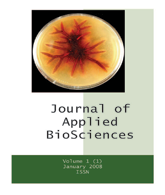Journal of Applied Biosciences (J. Appl. Biosci.) [ISSN 1997 - 5902]
Volume 56: 4089 - 4096. Published August, 2012.
Oumarou Diadié
Halima1, BALLA Abdourahamane 2 *et BARAGE Moussa 3
1 :
Département des productions végétales/Faculté d’Agronomie/Université Abdou
Moumouni de Niamey-Niger. Tel :
00227 96 98 53 86. E-mail : dialima75@yahoo.fr
2 :
CRESA/Faculté d’Agronomie/Université Abdou Moumouni de Niamey-Niger. BP
10960. Tel : 00227 20 31 59 42
/00227 96 27 10 44.
3 :
Département des productions végétales/Faculté d’Agronomie/Université Abdou
Moumouni de Niamey-Niger. Tel : 00227 96 98 17 07.
RESUME
Objectif : L’objectif de
cette étude, est d’analyser l’acceptabilité et l’efficacité de quatre recettes
développées pour contribuer à la réhabilitation nutritionnelle des enfants
malnutris admis au niveau du centre de récupération de Guidan Ider, installé
pendant la période d’urgence de Juin 2010.
Méthodologie
et Résultat : L’étude a concerné, 100 malnutris modérés âgés de
0 à 59 mois durant 30 jours. La statistique descriptive a été appliquée pour
analyser la variation pondérale. La typologie détaillée du groupe cible indique
que 40 enfants ont un âge compris entre 6 et 11 mois, 50 enfants sont âgés de
12 à 23 mois et 10 autres enfants ont un âge
compris entre 24 et 35 mois. Ces enfants ont reçu en complément au repas familial, deux rations journalières faites à base d’aliments
locaux. Les résultats anthropométriques
ont montrés un gain pondéral quotidien moyen de 9 à 19 g par enfant. Aussi, ce
gain est significatif par rapport à la valeur de référence de récupération 10 –
15g/Kg/j, démontrant ainsi une
efficacité satisfaisante des aliments de complément servis.
Conclusion
et application : Les recettes ont été unanimement
appréciées aussi bien des mères que des enfants. Durant la réhabilitation
nutritionnelle, l’apport en complément alimentaire élaboré à partir des 4
recettes a aidé à améliorer l’état nutritionnel des enfants malnutris modérés. Cette
étude constitue un support scientifique pour l’intégration de ces recettes dans
le programme national de nutrition et survie de l’enfant au Niger.
Mots
clés : Aliments,
acceptabilité, efficacité, enfants, Niger.
Abstract
Objective: The objective of this study was to analyze the
acceptability and effectiveness of four recipes developed to help nutritional
rehabilitation of malnourished children admitted at the recovery center Guidan
Ider, installed during the emergency of June 2010.
Methodology and Results: The study involved 100 moderately malnourished aged 0
to 59 months for 30 days. The descriptive statistics was applied to analyze the
weight variation. The detailed typology of the target group shows
that 40 children aged between 6 and 11 months, 50 children aged 12 to 23 months
and 10 children aged between 24 and 35 months. These children received in addition to family meals,
two daily rations made from based foods. Anthropometric results showed average
daily weight gain from 9 to 19 grams per child. So,
these earnings are significant compared with the reference value of recovery 10
- 15g / Kg / j, demonstrating
a satisfactory effectiveness of complementary foods served.
Conclusion and Application: Recipes were unanimously appreciated by both mothers
and children. During nutritional rehabilitation, dietary nutritional supplement
made from four recipes has helped to improve the nutritional status of
moderately malnourished children. This study constitutes a scientific support for the
integration of these recipes in the national program of nutrition and survival
of the child in Niger.
Keywords: Foods, acceptability, effectiveness, children, Niger.
FULL PAPER [PDF AVAILABLE HERE]
